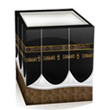"Allaahu Akbar": Does it Replace "Bismillah"?
- Details
- Category: Sheikh Otheimin
- Published on Tuesday, 12 November 2013 11:20
- Hits: 1187
"Allaahu Akbar": Does it Replace "Bismillah"?
Question:
Some reciters separating between two chapters of the Qur'aan by saying "Allaahu Akbar" rather than Bismillah, is this permissible? And is there any proof to prove or to disprove this practice?
Answer:
The practice you mention is contrary to how the Companions would separate chapters of the Qur'aan and contrary to what the people of knowledge do. The furthest one may go in this regard is to say that some reciters considered in recommended to say "Allaahu Akbar" after reading every chapter from "Ad-Dhuha" to the end of the Qur'aan, but even then, they recite "Bismillah" at the beginning of each chapter. The practice you refer to is not Sunnah - it is not related from the Prophet sallAllaahu `alayhi wa sallam. What is legislated is to begin every chapter of the Qur'aan - separating one chapter from another - with "Bismillah-ir-Rahman-ir-Rahim," with the exception being "Bara'a (i.e. At-Tawbah)" since there is no "Bismillah" between it and Surat Al-Anfal.
Shaykh Muhammad bin Saalih al-`Uthaymeen
Fatawa Islamiyah, vol.7 p.81





















